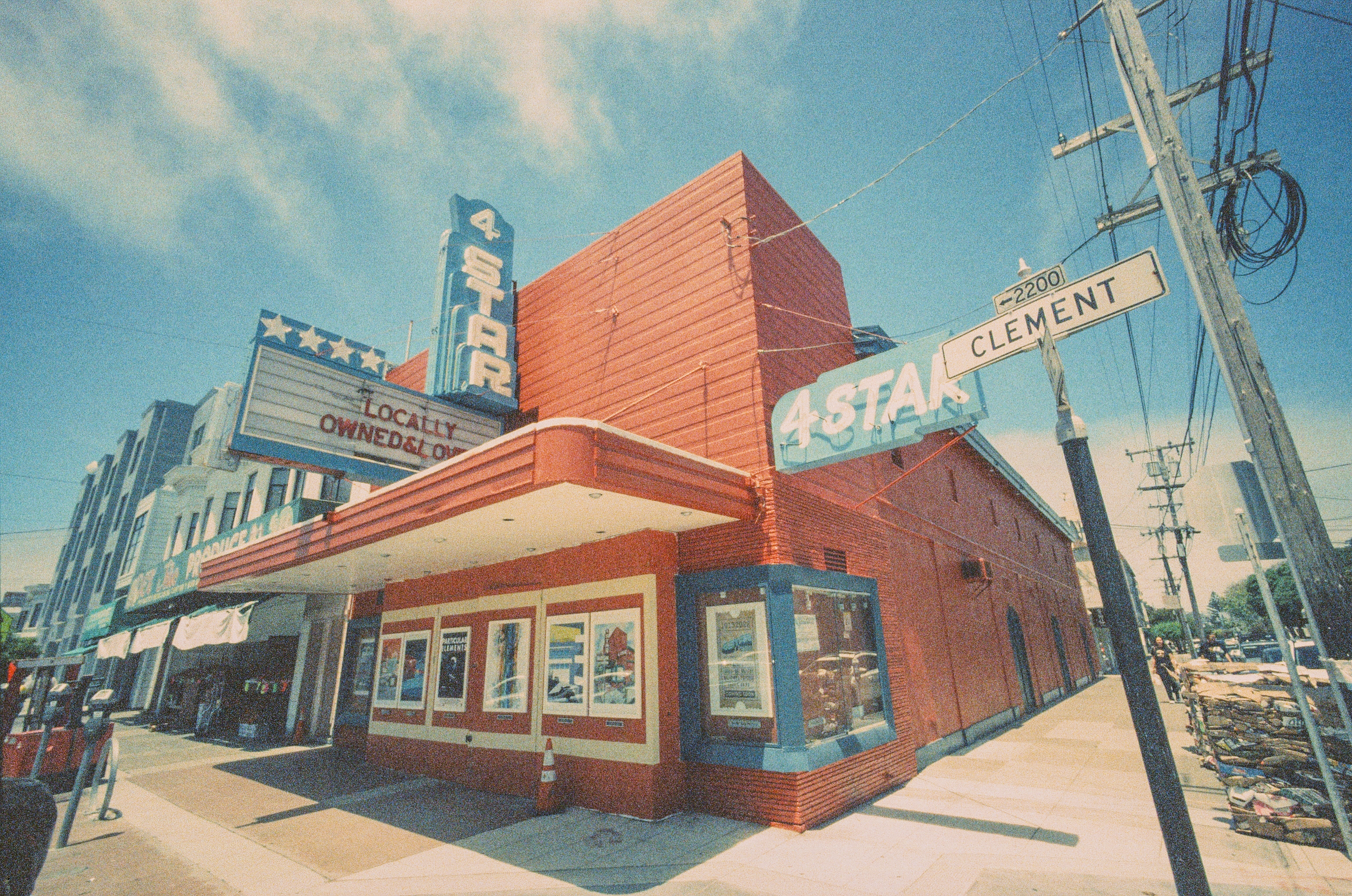Even before anyone yelled Covid in a crowded theater, the movie industry was having a hard time. Owing to a variety of factors—including improvements in consumer technology, the advent of streaming media and rising rents—over 35 of San Francisco’s neighborhood cinemas have permanently closed since 1978, according to Friends of 1800, a local historical organization.
During the pandemic alone, the Clay, the Empire and the Embarcadero theaters all shut down, and the Castro Theater finalized a controversial partnership with the concert production firm, Another Planet Entertainment.
But Adam Bergeron and Jaimi Holker—the husband-and-wife team behind CinemaSF—are out to prove neighborhood theaters are still viable. The couple already operates San Francisco’s Balboa and Vogue theaters. Their next challenge: The Richmond’s historic 4 Star Theater.
Built in 1912 and originally known as La Bonita, the 4 Star has survived through more than a century of ownership changes, programming overhauls and various renovations. Most recently, the 4 Star was owned and operated by Lee Neighborhood Theatres, whose programming specialized in Hong Kong cinema and other Asian films. Due to a pandemic-related slowdown, the Lee family, who still operates the Presidio and Marina theaters, sold the 4 Star.
This August, CinemaSF will reopen the 4 Star. While adding a third San Francisco theater to its repertoire at a time when other local movie theater owners are looking for a way out could be seen as a bad bet, Bergeron, who co-owns CinemaSF with Holker, doesn’t see it that way.
In fact, according to Bergeron, CinemaSF has hit upon a winning business model in a turbulent era for the movie industry. That model hinges on forming deep relationships with the neighborhoods his theaters serve. Quirky, staff-curated series, like AniMondays or VHS Throwback Wednesdays, make CinemaSF’s theaters feel like an extension of its staffs’ personalities. And the theaters strive to cater to local patrons’ preferences, regularly incorporating attendees’ suggestions into upcoming programming. Reflecting on the impact of such personalized programming, Adam said that the theaters become “almost like a neighborhood bar.”
Lex Sloan, director of the Mission’s non-profit Roxie Theater, said she thinks the strategy is smart. From her perspective, CinemaSF’s approach works because it gives patrons the sense that they are participating in a truly homegrown community. CinemaSF curates local beer lists, hires local artists to design their merch and has their branded clothing printed at Babylon Burning, a San Francisco legacy business.
“From providing space for local artists to musicians to drag performers, they’re thinking really creatively about what the movie-going experience is like,” she said, adding that CinemaSF’s theaters enable guests to “create memories to carry with them far beyond when they leave the theater.”
Of course, community goodwill can only carry a business so far. Also aiding CinemaSF’s survival are reasonable rents negotiated by friendly landlords.
The San Francisco Neighborhood Theater Foundation, a not-for-profit organization dedicated to preserving neighborhood theaters, owns the properties that house the Balboa and the Vogue theaters. In 2011, after the existing operator of the theaters, Gary Meyer, stepped down, the foundation put out a call for a new operator. Bergeron and Holker were intrigued, and after negotiating a substantially reduced lease, the pair assumed operations of the two historic theaters.
Similarly, upon learning the 4 Star might fall into the hands of a wealthy San Franciscan, who wanted to use the theater for his personal band practice space, an anonymous local resident and CinemaSF patron stepped up, purchasing the 4 Star to help preserve the theater. The owner now leases the theater to CinemaSF at a much more sustainable rate than the open market would have dictated.
Holker explained that landlords who aren’t purely beholden to profit are essential to many of San Francisco’s beloved local businesses. “It always helps if your rent is not based on a percentage of profit margin,” she said, adding: “We’re not a huge corporation, and so it definitely helps.”
Still, even reasonable rents never guaranteed CinemaSF’s survival. In the early months of the pandemic, Bergeron feared their theaters would fold. “During the pandemic, there was every chance that the Balboa and the Vogue were going to go down. In a lot of ways, it was more likely than not. The will of the neighborhood kept it all alive.”
Creative programming, like a joint drive-in with The Roxie, provided opportunities for loyal supporters to purchase merchandise, beer and popcorn, which helped the theaters weather the toughest months of Covid-related shutdowns.
Now, as the 4 Star prepares to reopen in mid-August, Bergeron and Holker are overseeing renovations to make the 4 Star even more resilient than their previous theaters. The smaller of the 4 Star’s two screens will be converted into an art gallery. The concession stand in the lobby will become a fully functioning cafe. And staff will continue to dictate the programming based on their tastes and feedback from the local neighborhood.
Residents of the Clement corridor where the 4 Star is located are looking forward to the 4 Star’s reopening. Vivian Nguyen, Food Manager of Thanh Thanh Cafe, said that the reopening will increase foot traffic by bringing more entertainment to the neighborhood. “It’s a historic building. I’m glad it’s not turning into something else,” Nguyen said. “It represents the city.”
Devilliers Alison, who was born and raised in The Richmond, agreed. “It’s one of the few places I can look back on and go: It’s still here. Not some crazy boutique. Not high-rise apartments. It’s nostalgia. A piece of old San Francisco.”
Correction: This article has been updated to reflect that Another Planet Entertainment did not purchase the Castro Theatre.
